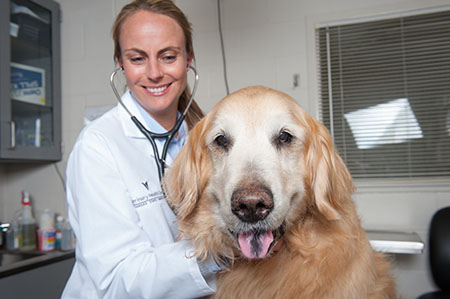Raelene Wouda’s passion for improving cancer treatment starts with our four-legged friends.
Wouda, Kansas State University assistant professor of clinical sciences, is conducting clinical trials to treat cancers in dogs, cats and other companion animals.
When pet owners bring their dogs, cats, horses and other animals to the College of Veterinary Medicine’s Veterinary Health Center for treatment, Wouda and the Oncology Service can offer groundbreaking new treatments often at a lower cost to pet owners.
Wouda also is able to study important topics, such as improved diagnostic testing, monitoring approaches and innovative treatment options, including anti-cancer vaccines, t-cell transfer, combination chemotherapy and nanoparticle drug formulations. She has recently published her research in Veterinary Comparative Oncology and the Journal of the American Veterinary Medical Association.
 Raelene Wouda, Kansas State University assistant professor of clinical sciences,
Raelene Wouda, Kansas State University assistant professor of clinical sciences,
is conducting clinical trials to treat cancers in dogs, cats and other companion animals.
“Although surgery, radiation therapy, chemotherapy and, more recently, immunotherapy have improved patient outcomes, many cancers still do not have a long-term cure,” said Wouda, a clinical veterinary oncologist. “These clinical trials are a crucial step.”
But Wouda’s research benefits humans, too. Many cancers in animals — especially dogs — are similar to those in humans, which means that the diagnosis, monitoring, treatment and response to treatment are also similar.
“Any research that we do in our patients has the potential to provide important information for how the disease can be better diagnosed, monitored and treated in human patients,” Wouda said. “That’s what I would like to do with our research. I would like to continue to improve outcomes for our veterinary patients and, by extension, help human cancer patients.”
Companion animals offer several research advantages. Wouda’s clinical trial program focuses primarily on dogs because of the similarities between their cancers and human cancers, such as osteosarcoma, melanoma, lung cancer and urogenital cancers. Osteosarcoma, for example, is both clinically and genetically almost identical in dogs and human pediatric patients.
Dogs also live with us and are exposed to the same environmental factors. Additionally, because dogs age faster than humans — one dog year is equivalent to seven human years — their diseases progress faster, which is a practical advantage for rapidly evaluating a new treatment’s efficacy and clinical benefit, Wouda said.
“We get clinical answers more quickly in dogs,” Wouda said. “The benefit of a particular therapy becomes evident in dogs more rapidly compared to people, and because of this we can preserve research and development finances, but more importantly, we save valuable time and resources.”
Animal clinical trials are structured similarly to human clinical trials and are tightly regulated and overseen. Wouda works with Mary Lynn Higginbotham, associate professor of clinical sciences, their graduate students and oncology technicians as well as the Veterinary Health Center’s referring veterinarians to conduct these clinical trials. They also collaborate with human medical researchers to discuss how the research can best be applied in the field of human oncology.
“For many pet owners, cancer is a terminal diagnosis for their beloved family member,” Wouda said. “These studies provide owners an opportunity to trial a cutting-edge therapy for their pets at a reasonable price. Moreover, owners participating in these clinical trials take comfort and are pleased to know that they are helping to achieve better treatments and outcomes for pets that may be diagnosed with cancer in the future.”
Wouda has received previous and current funding from the university’s Johnson Cancer Research Center, the American College of Veterinary Internal Medicine Foundation, the Mark Derrick Canine Research Fund, the Kansas IDeA Network of Biomedical Research Excellence and Zoetis Animal Health.
Article reposted from:
http://www.k-state.edu/media/newsreleases/jun16/wouda61316.html
Written by Jennifer Tidball
Kansas State University

Recent Comments